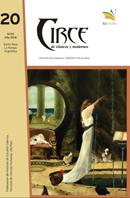What divine providence means in the theology of Philo of Alexandria
Keywords:
Divine Providence, Philo of Alexandria, Platonism, StoicismAbstract
Divine providence (πρόνοια τοῦ θεοῦ) in the texts of Philo of Alexandria is a philosophical or religious concept that points at the care of God for his creatures. As a first source we must consult the Timaeus to find the Platonic idea of providence sustained by the axiom that God is not the cause of evil, a principle that Philo follows in his theodicy. The Stoic philosophers took from Plato the idea of divine providence and adapted it to their own materialistic philosophy. Combining Platonic and Stoic elements Philo expresses in various places his idea of God’s providence. Philo wrote two treatises with the title On providence –probably at the end of his life–, which we will briefly discuss here. In On the Creation of the World according to Moses 171-172, Philo offers a compendium of his theology where his idea of God appears, and therefore his theory of the creation and the concept of providence. The analysis will focus on the explanation of providence in historical treatises and on the particular construction of the concept in the Hellenistic Jewish patriarchal society.
Downloads
Downloads
Published
Issue
Section
License
Los autores que tengan publicaciones con esta revista, aceptan los términos siguientes referidos a los derechos de autor/a:
1. Los autores/as conservarán sus derechos de autor y garantizarán a la revista el derecho de primera publicación de su obra, el cuál estará simultáneamente sujeto a la Licencia de reconocimiento de Licencia Creative Commons Atribución-NoComercial-CompartirIgual 4.0 Internacional (http://creativecommons.org/licenses/by-nc-sa/4.0/). que permite a terceros compartir la obra siempre que se indique su autor y su primera publicación esta revista. El autor es el titular del copyright.
2. Los autores/as podrán adoptar otros acuerdos de licencia no exclusiva de distribución de la versión de la obra publicada (postprint) siempre que se indique la publicación inicial en esta revista. La cesión de derechos no exclusivos implica también la autorización por parte de los autores para que el trabajo sea depositado en el repositorio institucional y difundido a través de las bases de datos que el editor considere adecuadas para su indización, con miras a incrementar la visibilidad de la publicación y de sus autores.
3. Se permite y recomienda a los autores/as difundir su obra a través de Internet antes y durante el proceso de envío, lo cual puede producir intercambios interesantes y aumentar las citas de la obra publicada.







.jpg)









2.png)



